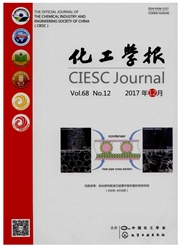

 中文摘要:
中文摘要:
利用分子膜阻蒸发技术制备了一种甲醛抑制剂,能在甲醛液体界面自行铺展成膜。形成的分子膜可抑制甲醛气体的生成与传输。探讨了环境温度、分子膜的铺膜浓度对甲醛气液界面传质系数的影响;通过分子膜表面压研究了抑制剂在气液界面的铺展性能;通过麦克斯韦位移电流法(MDC)及原子力显微镜(AFM)表征了分子膜在气液界面的微观结构;得出了分子膜抑制甲醛有毒气体生成与传输的机理:分子膜的致密性抑制了甲醛气体的传输;甲醛水合分子的形成,分子间氢键的作用,提高了分子的稳定性,抑制了甲醛气体的生成。
 英文摘要:
英文摘要:
Formaldehyde inhibitor was prepared by the monolayer evaporation inhibition technology.The inhibitor could spontaneously spread on the formaldehyde surface to form an insoluble film.It controlled generation of formaldehyde gas by way of blocking its escape and changing the molecular structure of hydrated formaldehyde on the interface layer.The effect of temperature and filming concentration of the monolayer on transfer coefficient for formaldehyde on gas-liquid interface was discussed.Spreading performance of the inhibitor was determined using the surface pressure technique.The microstructure of the monolayer on the gas-liquid interface was described by Maxwell displacement current(MDC)and atomic force microscopy(AFM).The mechanism that the monolayer inhibited the generation and transport of formaldehyde was that the compactness of the monolayer reduced the transport of formaldehyde gas at the interface.Moreover,hydrated formaldehyde molecules could be formed,and the molecular interaction increased due to the existence of hydrogen bond.Thus formaldehyde became more stable and the formation of toxic gas was effectively inhibited.
 同期刊论文项目
同期刊论文项目
 同项目期刊论文
同项目期刊论文
 期刊信息
期刊信息
